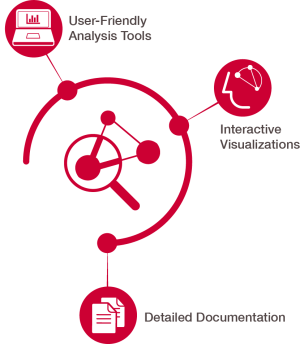|
The GDC provides an array of interactive, web-based Analysis Tools for performing in-depth gene- and variant- level analyses. The workflow is cohort-centric, meaning analyses are specific to a researcher's cohort of interest.
|
Documentation
Data Analysis Tools
The GDC provides interactive, cohort-centric tools for analyzing genomic and clinical data.
Data Analysis Policy
Policies and guidelines for appropriate use of data, are provided by the GDC whether open- or controlled- access.
Data Harmonization and Generation
The GDC developers best-in-practice pipelines for processing the most common molecular platforms. Variant calling, gene expression analysis, and other pipelines are implemented using software and algorithms selected in consultation with experts in the genomics community.
What’s New with GDC and Cancer Research
Cancer Research Highlights and Publications:
How is survival analysis calculated?
Survival analysis in the GDC uses a Kaplan‑Meier estimator:
- S(t ) is the estimated survival probability for any particular one of the t time periods
- n is the number of subjects at risk at the beginning of time period t
- d is the number of subjects who die during time period t
Please refer to the GDC Data Portal User's Guide Projects for additional information.
Need help with data retrieval, download, or submission?


